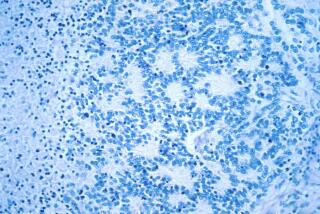Working on a ‘Smart Bomb’ for Cancer
- Share via
NEW ORLEANS — Researchers are experimenting with using cancer to fight cancer, injecting reprogrammed cells into otherwise untreatable tumors.
In test tubes and in mice, irradiated ovarian cancer cells that have been implanted with the herpes virus gene have located and bonded to tumor cells.
Once in place, the attacking cells produce an enzyme that turns toxic to themselves and their neighbors when treated with an antiviral drug called ganciclovir.
“I almost like to call them smart bombs,” said Dr. Scott Freeman, a pathologist at Tulane University Medical Center. “They’ll home [in on] tumor deposits . . . and they’ll actually sit down on the tumor.”
Trials underway at Tulane and Louisiana State University Medical Center are a new wrinkle in tests of “suicide gene” therapy. The therapies usually use a virus to carry genes into the tumor, an approach that has two problems.
One is that a virus hits all cells, whether or not they are cancerous. The other is that the body readily sets up an immune response to the virus and eliminates it, said Dr. Jay Kolls, head of the LSU hospital’s new gene-therapy program. “One of the things we’ll be looking for is if a cell is better than a virus at delivering the gene,” he said.
In testing on ovarian cancer patients at Tulane and Brown University, the average survival has been 12 months for women who were not responding to other treatment and had a life expectancy of nine months.
“We’re not sure if that was significant or not, but it was not hurting them, and toxicity was minimal,” Freeman said.
The treatment about doubled survival in mice, he said.
Dr. Savio Woo, who pioneered suicide gene therapy, said he hadn’t heard of any work in the field that didn’t involve use of viruses.
“It is different. . . . The advantage is no virus. But I don’t know how effective it is without producing a virus,” he said.
The advantage, Kolls said, is the death of virtually every cancer cell in lab tests and the ability to target cancer.
About 100 million ovarian cancer cells were dripped recently into the space between the Rev. John Vaughn’s left lung and his chest as part of the research being conducted by Kolls and Freeman.
Vaughn and five other patients will get a single dose of the cells followed by a week of ganciclovir to see whether the treatment is safe. If they do well, 10 patients will get up to three increasing doses of the cells, a month apart.
Vaughn, 71, was diagnosed six months ago with mesothelioma, a rare form of cancer that attacks the thin layer of cells on the surface of organs and inside body cavities. He was given a life expectancy of less than two years.
Vaughn isn’t leaving his treatment entirely up to the researchers. He’s eating a strict vegetarian diet and taking vitamins and shark cartilage as well. And, as a devout Christian, he considers his requests for prayers part of his treatment regimen.
“I’m using far-out sort of alternative medicine . . . and then I’m doing the very cutting edge of conventional medicine, plus a lot of prayer and a lot of faith,” he said. “You know, if the Lord chooses to use these means to cure me, I’m issuing the invitation. But I’m fully resigned to whatever God wants.”






